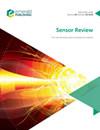Evaluation of low-cost electronic sensors for monitoring soil moisture in an experimental area in the Brazilian semiarid
IF 1.4
4区 工程技术
Q3 INSTRUMENTS & INSTRUMENTATION
引用次数: 0
Abstract
Purpose This paper aims to determine and evaluate the calibration curve for low-cost electronic sensors in soils from a reclaimed and degraded area in the Brazilian semiarid region. Design/methodology/approach The probes were made, programmed and inserted in soil previously conditioned in polyethylene cylinders. The sets “cylinder + probe + soil” were subjected to saturation for a period of 24 h and, subsequently, gravitational drainage at room temperature and daily weighings were performed. When the set reached constant weight, the samples were taken to dry in an oven at 105°C to determine the dry mass and later, determine the gravimetric moisture and convert it into volumetric. The volumetric moistures obtained were related to measured frequency variations and the adjustments were analyzed by regression, which was subjected to analysis of variance (p = 0.05), and related by a third-degree polynomial equation whose quality of the fit was verified with coefficient of determination (R2). Findings The obtained moistures were related to the estimated moistures and evaluated by the root-mean-square error and straight 1:1. The results demonstrate that the sensors are not accurate for moistures in saturation, but representative and statistically acceptable results for moistures up to field capacity. Originality/value This paper has not been published before in its current, or similar form.低成本电子传感器在巴西半干旱试验区监测土壤湿度的评价
目的本文旨在确定和评估巴西半干旱地区开垦和退化地区土壤中低成本电子传感器的校准曲线。设计/方法/方法将探针制作、编程并插入预先在聚乙烯圆柱体中处理过的土壤中。“圆柱体+探头+土壤”组在24小时内处于饱和状态 h,然后在室温下进行重力排水并每天称重。当套件达到恒定重量时,将样品在105°C的烘箱中干燥,以确定干燥质量,然后确定重量水分并将其转换为体积。获得的体积湿度与测量的频率变化有关,并通过回归分析调整,进行方差分析(p=0.05),并通过一个三次多项式方程进行关联,该方程的拟合质量用决定系数(R2)进行了验证。结果表明,传感器对饱和湿度不准确,但对达到现场容量的湿度具有代表性和统计上可接受的结果。原创性/价值这篇论文以前从未以目前或类似的形式发表过。
本文章由计算机程序翻译,如有差异,请以英文原文为准。
求助全文
约1分钟内获得全文
求助全文
来源期刊

Sensor Review
工程技术-仪器仪表
CiteScore
3.40
自引率
6.20%
发文量
50
审稿时长
3.7 months
期刊介绍:
Sensor Review publishes peer reviewed state-of-the-art articles and specially commissioned technology reviews. Each issue of this multidisciplinary journal includes high quality original content covering all aspects of sensors and their applications, and reflecting the most interesting and strategically important research and development activities from around the world. Because of this, readers can stay at the very forefront of high technology sensor developments.
Emphasis is placed on detailed independent regular and review articles identifying the full range of sensors currently available for specific applications, as well as highlighting those areas of technology showing great potential for the future. The journal encourages authors to consider the practical and social implications of their articles.
All articles undergo a rigorous double-blind peer review process which involves an initial assessment of suitability of an article for the journal followed by sending it to, at least two reviewers in the field if deemed suitable.
Sensor Review’s coverage includes, but is not restricted to:
Mechanical sensors – position, displacement, proximity, velocity, acceleration, vibration, force, torque, pressure, and flow sensors
Electric and magnetic sensors – resistance, inductive, capacitive, piezoelectric, eddy-current, electromagnetic, photoelectric, and thermoelectric sensors
Temperature sensors, infrared sensors, humidity sensors
Optical, electro-optical and fibre-optic sensors and systems, photonic sensors
Biosensors, wearable and implantable sensors and systems, immunosensors
Gas and chemical sensors and systems, polymer sensors
Acoustic and ultrasonic sensors
Haptic sensors and devices
Smart and intelligent sensors and systems
Nanosensors, NEMS, MEMS, and BioMEMS
Quantum sensors
Sensor systems: sensor data fusion, signals, processing and interfacing, signal conditioning.
 求助内容:
求助内容: 应助结果提醒方式:
应助结果提醒方式:


